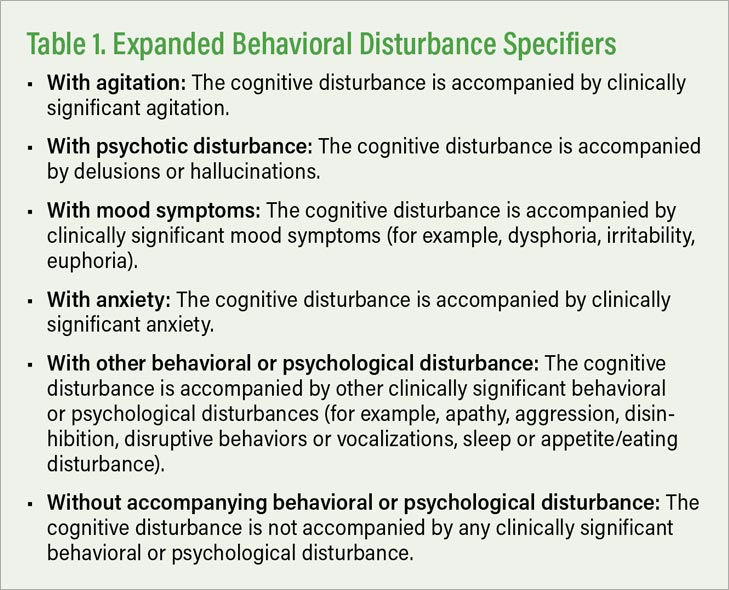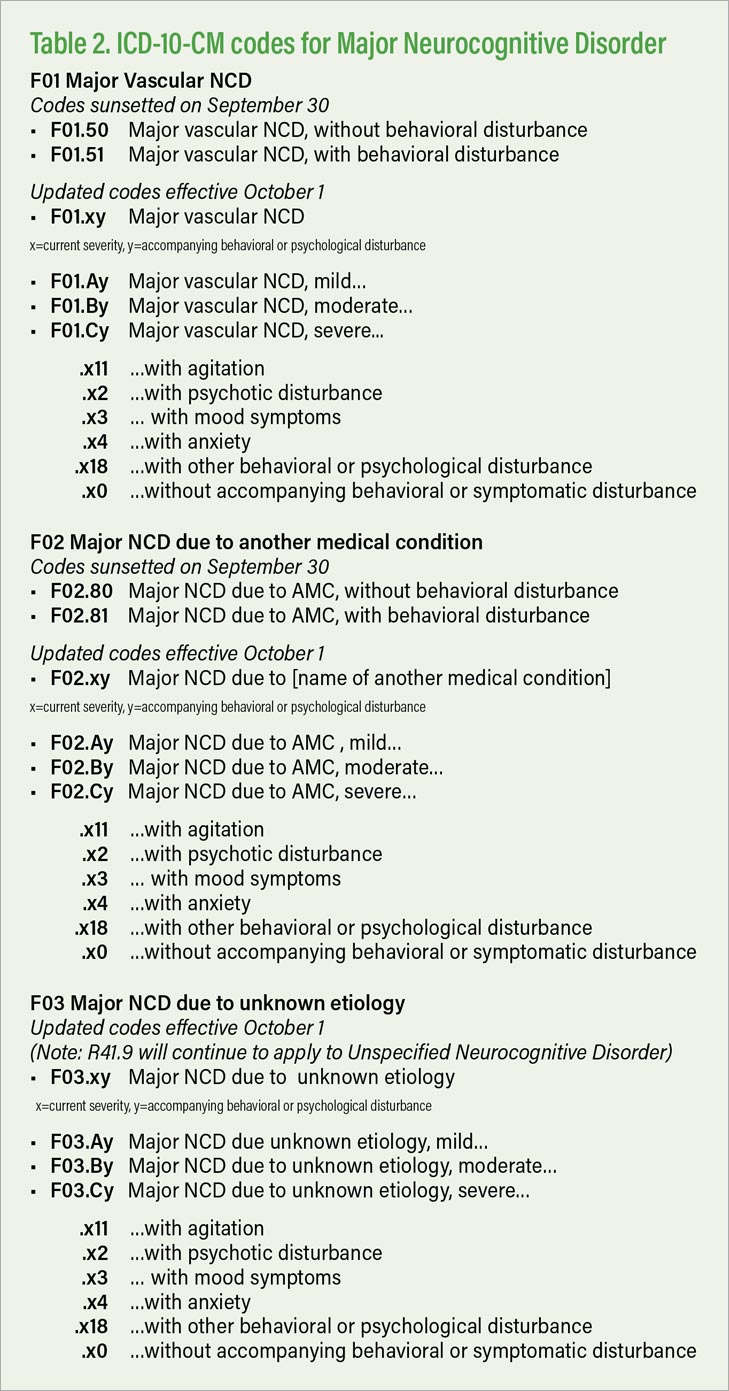New ICD-10-CM Codes for Neurocognitive Disorders Effective October 1
Abstract
The coding changes for major and mild neurocognitive disorders represent the most consequential coding changes for DSM-5 disorders since the October 1, 2015, changeover from ICD-9-CM to ICD-10-CM.
Every October 1, the ICD-10-CM codes for all of medicine are updated, resulting in the addition of new codes and the revision or deletion of existing codes. Only a small fraction of the 68,000 codes are actually affected; last year, 159 new codes were added, 25 codes were deleted, and 27 existing codes were revised. Given that all HIPAA-compliant health care entities are required to use the most up-to-date ICD-10-CM codes, clinicians and institutions need to keep on top of these coding changes, especially since the addition of new codes usually results in some existing codes becoming obsolete.
This year the coding changes are largely confined to major and mild neurocognitive disorders, but they represent the most consequential coding changes for DSM-5 disorders since the October 1, 2015, changeover from ICD-9-CM to ICD-10-CM.
Changes for Major Neurocognitive Disorder
The first three characters that make up the ICD-10-CM code for major neurocognitive disorder depend on the type of etiological medical condition and are unchanged:
F01 for major neurocognitive disorder due to vascular disease.
F02 for major neurocognitive disorder due to other medical conditions (where the specific etiological medical condition is indicated by also listing the ICD-10-CM code for the medical condition).
F03 for major neurocognitive disorder when the medical etiology is unknown.

Although DSM-5-TR diagnostic criteria for major neurocognitive disorder include severity specifiers (mild, moderate, severe), there is no provision for indicating this clinically important information in the current ICD-10-CM code for major neurocognitive disorder. But this year, coding changes for major neurocognitive disorders taking effect include the provision of a fourth character code to indicate the severity of the major neurocognitive disorder and a combination of fifth and sixth characters to indicate the presence of an accompanying behavioral or psychological disturbance.

The fourth character in the code is designated for indicating current severity as follows: “A” indicates mild (difficulties with instrumental activities of daily living, such as housework and managing money), “B” indicates moderate (difficulties with basic activities of daily living (such as feeding and dressing), and “C” indicates severe (fully dependent).
In the late 1990s, it was brought to APA’s attention that because Alzheimer’s disease was classified in ICD-9-CM as a neurological condition, psychiatrists were having difficulty getting their services covered by insurers. Consequently, APA requested the addition of a fifth digit to the ICD-9-CM code for dementia due to a medical condition to indicate the presence or absence of a behavioral disturbance accompanying the dementia: 294.10 indicated dementia without behavioral disturbance, and 294.11 indicated dementia with behavioral disturbance.
To provide greater detail regarding the nature of the behavioral disturbance, this year new fourth and fifth character codes are available for indicating any accompanying behavioral or psychological disturbance. To accommodate these new codes, the “with behavioral disturbance” specifier in the DSM-5-TR diagnostic criteria for major neurocognitive disorder has been expanded to include the following: 11=with agitation, 2=with psychotic disturbance, 3=with mood symptoms, 4=with anxiety, 18=with other behavioral or psychological disturbance, and 0=without accompanying behavioral or psychological disturbance. (See Table 1 for definitions.)
Table 2 shows the combined coding for severity and accompanying behavioral or psychological disturbances for each of the three types of major neurocognitive disorders due to medical conditions: due to vascular disease, due to other medical conditions, and due to unknown etiology.
Changes for Mild Neurocognitive Disorder
As part of the effort to make DSM more dimensional, DSM-5 replaced the DSM-IV dementia category with major neurocognitive disorder and mild neurocognitive disorder. A longstanding ICD convention for coding mental disorders due to the direct physiological consequences of a medical condition is to employ two diagnostic codes: one code to indicate the symptomatic manifestations of the medical condition from a psychiatric perspective and a second code for the etiological medical condition. (for example, F06.31 depressive disorder due to hypothyroidism; and E03.9 hypothyroidism.
The only exception to this convention is the instruction in DSM-5-TR to use the single code, G31.84, for mild neurocognitive disorder due to a medical condition, regardless of the specific etiology (G31.84 is the ICD-10-CM code for mild cognitive impairment located in the “Diseases of the Nervous System” chapter). The October 1 update reflects the addition to ICD-10-CM of two new mental disorder codes, F06.71 and F06.70 for mild neurocognitive disorder due to a medical condition with or without a behavioral disturbance, respectively. As is the case with major neurocognitive disorder due to a medical condition, this diagnosis now requires a separate code for the etiological medical condition. ■




